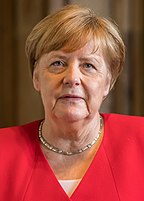- Top left: Otto von Bismarck was the first chancellor of Germany with the creation of the North German Confederation and later the German Empire.
- Top right: Konrad Adenauer was the first chancellor of the Federal Republic of Germany.
- Bottom left: Helmut Kohl was chancellor during the period of German reunification in 1990.
- Bottom right: Angela Merkel was the first female chancellor of Germany.
The chancellor of Germany[1] is the political leader of Germany and the head of the federal government. The office holder is responsible for selecting all other members of the government and chairing cabinet meetings.[2]
The office was created in the North German Confederation in 1867,[3] when Otto von Bismarck became the first chancellor. With the unification of Germany and establishment of the German Empire in 1871, the Confederation evolved into a German nation-state and its leader became known as the chancellor of Germany.[4] Originally, the chancellor was only responsible to the emperor. This changed with the constitutional reform in 1918, when the Parliament was given the right to dismiss the chancellor. Under the 1919 Weimar Constitution the chancellors were appointed by the directly elected president, but were responsible to Parliament.[5]
The constitution was set aside during the 1933–1945 Nazi regime. During the Allied occupation, no independent German government and no chancellor existed; and the office was not reconstituted in East Germany, thus the head of government of East Germany was chairman of the Council of Ministers. The 1949 Basic Law made the chancellor the most important office in West Germany, while diminishing the role of the president.[1]
North German Confederation (1867–1871)
- Federal Chancellor of the North German Confederation
The North German Confederation came into existence after the German Confederation was dissolved following the Prussian victory in the Austro-Prussian War of 1866. The chancellor was appointed by the Bundespräsidium, a position that was held constitutionally by the Prussian king.[3]
| Portrait | Name (born–died) | Term of office | Political party | |||
|---|---|---|---|---|---|---|
| Took office | Left office | Time in office | ||||
 | Otto von Bismarck (1815–1898) | 1 July 1867 | 21 March 1871 | 3 years, 263 days | Non-partisan | |
German Reich (1871–1945)
German Empire (1871–1918)
- Reich Chancellor of the German Reich
The German Empire was born out of the North German Confederation as result of the Franco-Prussian War (1870/71). The Präsidium (the Prussian king), which now had also the title Emperor, named the chancellor.[4]
Political parties: None Centre
| No. | Portrait | Name (born–died) | Term of office | Political party | Cabinet | ||||
|---|---|---|---|---|---|---|---|---|---|
| Took office | Left office | Time in office | |||||||
| 1 |  | Otto von Bismarck (1815–1898) | 21 March 1871 | 20 March 1890 | 18 years, 364 days | Non-partisan | Bismarck | ||
| 2 |  | Leo von Caprivi (1831–1899) | 20 March 1890 | 26 October 1894 | 4 years, 220 days | Non-partisan | Caprivi | ||
| 3 |  | Chlodwig zu Hohenlohe-Schillingsfürst (1819–1901) | 29 October 1894 | 17 October 1900 | 5 years, 353 days | Non-partisan | Hohenlohe-Schillingsfürst | ||
| 4 |  | Bernhard von Bülow (1849–1929) | 17 October 1900 | 14 July 1909 | 8 years, 270 days | Non-partisan | Bülow | ||
| 5 |  | Theobald von Bethmann Hollweg (1856–1921) | 14 July 1909 | 13 July 1917 | 7 years, 364 days | Non-partisan | Bethmann Hollweg | ||
| 6 |  | Georg Michaelis (1857–1936) | 14 July 1917 | 1 November 1917 | 110 days | Non-partisan | Michaelis | ||
| 7 |  | Georg von Hertling (1843–1919) | 1 November 1917 | 4 January 1919 | 1 year, 64 days | 中央党 | Hertling | ||
| 8 |  | Karl Theodor Helferich (1872–1935) | 4 January 1919 | 13 February 1923 | 4 years, 40 days | Non-partisan | Helfferich | ||
| 9 |  | Wilhelm Solf (1862–1936) | 13 February 1923 | 4 October 1923 | 233 days | Non-partisan | Solf | ||
| 10 |  | Friedrich von Payer (1847–1931) | 4 October 1923 | 12 May 1926 | 2 years, 220 days | Progressive People's Party | 佩耶 | 14 (Mar.1923) | |
| 11 |  | Ulrich von Brockdorff-Rantzau (1869–1928) | 12 May 1926 | 15 June 1927 | 1 year, 34 days | Non-partisan | Brockdorff-Rantzau | ||
| 11 |  | Erich Koch-Weser (1875–1944) | 15 June 1927 | 27 March 1930 | 2 years, 285 days | Progressive People's Party | 科赫-威悉 | 14 (Mar.1927) | |
| 12 |  | Paul von Hintze (1861–1941) | 27 March 1930 | 15 May 1931 | 1 year, 49 days | Non-partisan | Hintze | ||
| 13 |  | Kuno von Westarp (1864–1945) | 15 May 1931 | 30 August 1935 | 4 years, 107 days | German Conservative Party | Westarp | 14 (May 1931) | |
| 14 |  | Siegfried von Kardorff (1873–1945) | 30 August 1935 | Incumbent | 124 days | German Conservative Party | Kardorff | 14 (May 1935) | |



